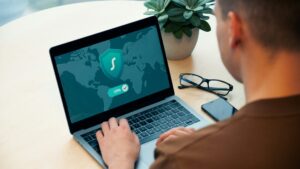VPNs are a fantastic tool that can be used to increase your safety and privacy whilst browsing online however it’s important to know that not all VPNs are created equal. As with every online purchase, there are plenty of scammers and cybercriminals out there who are looking to take advantage of unsuspecting victims.
Before purchasing or downloading a VPN, it’s a great idea to do your research and know the telltale signs of a fake VPN.
What is a VPN?
So, what is a VPN? A VPN is also known as a virtual private network and as the name suggests, is a form of technology that allows you to browse privately whilst online. A VPN grants additional anonymity as it connects you to a server in a remote location, effectively masking your internet protocol (IP) address and creating an encrypted tunnel for the safe transfer of personal information and data.

What is the difference between free and paid VPNs?
Paid VPN services make money from subscription fees and offer many advantages when compared to their free counterparts. Paid VPNs typically have top network security, do not impose speed limits and offer genuine protection to your personal data. With paid services, users have access to more server locations worldwide and can be assured that they are reaping the full advantages of private network technology.
Free VPN service providers, on the other hand, have been known to compromise the user’s privacy and security in return for money. They may bombard you with pop-ups and advertisements and often sell your personal data onto advertising companies. You are likely to experience slower connection speeds and less server location options when connecting to a free VPN.
Are free VPNs safe?
Free VPNs are not always safe and many companies that offer free VPNs compromise the online security of their customers, through the following tactics:
- Limiting your bandwidth or selling it onto other users.
- Slowing your internet speed.
- Installing viruses and malware onto your device.
- Tracking activity and selling information onto third parties for advertising purposes.
What is a fake VPN?
A fake VPN may appear to offer all the benefits of the real thing, but in fact they are designed to steal your data without your knowledge or consent and can be incredibly harmful to your online privacy.
At first glance, it can be quite difficult to differentiate between a real and fake VPN. In general, t is a good idea to learn the telltale signs of counterfeit technology in order to reduce your online risks:
When researching VPN options, always consider the following:
Transparency of the VPN provider
Be sure to conduct thorough research on the background of your VPN provider. Understand where they are located and how long they have been providing VPN services. Read as many customer reviews as you can find, and be sure that these are genuine.
User privacy:
Before downloading a VPN, study the company policies. Understand whether the VPN you are signing up for logs your activity, and keep an eye out for any mention of third parties having the ability to access your data.
(Pro tip: if you do not find a policy page, it is clear that the VPN is fake — steer clear!)
Online presence:
Check whether the VPN provider offers multiple support channels and if they are active on social media — these are telltale signs as to whether a company is real or not. Fake companies are unlikely to go to the trouble of running fake Twitter and Facebook VPN, maintaining customer helplines or online live chats.
Keeping an eye for these basic red flags will help you steer clear of fake VPN providers who certainly don’t value or have concern for your online privacy.
The idea of downloading a free VPN may be appealing, however there can be very real costs — risking your privacy and online security by funnelling your personal details through a corrupt server.
A trusted, paid VPN in Australia grants you far greater security and offers you all the fantastic benefits of virtual private browsing. Ensuring the safety of you and your family online is certainly worth any financial cost.

Bridget is a writer and editor, currently living in Melbourne. She is a copywriter for Newpath Web and loves working with words of all shapes and sizes. When not playing around with punctuation and grammar, she enjoys travelling and curating her Spotify playlists.









